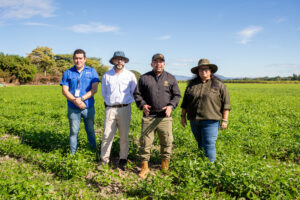The Government intensifies its efforts to protect national livestock. The veterinary brigades of the Ministerio de Agricultura y Ganadería (MAG) are deployed in several districts of the department of Chalatenango, as part of the work in the territory to prevent and control the Gusano Barrenador (GBG).

One of the points attended was the district of Agua Caliente, cattle ranchers José Leonardo González and Rafael Ángel Flores expressed their concern about the plague, which mainly affects recently calved cows, warm-blooded animals with open wounds or bat bites.
“We are having inconveniences with wounds in cattle, especially in calving cows and bat bites, because the fly lays its eggs there. It is important to be vigilant, as this problem is aggravated in animal wounds”, said cattle rancher José González.
The producers called on farmers throughout the country to maintain constant vigilance over their animals and report any suspected infestation wounds.
MAG brigades visited Nueva Concepción, Dulce Nombre de María, San Francisco Morazán, El Paraíso and the mountainous area of San Ignacio. They carried out inspections and applied preventive and control treatments to production animals and pets, explained MAG technician Ricardo León.

The distribution of more than 1,200 technicians nationwide is part of a coordinated effort between MAG, the Ministerio de Salud, the Policía Nacional Civil, the Fuerza Armada, the Organismo Internacional Regional de Sanidad Agropecuaria (OIRSA), and the Instituto Interamericano de Cooperación para la Agricultura (IICA).
The brigades carry out field inspections, training for producers and deworming of cattle. The main objective is to detect and prevent the spread of GBG. “We are carrying out a deworming campaign for preventive purposes, and we are also attending to dogs, as well as any other warm-blooded animal”, said MAG technician Enrique López Guerra.
He said that if a bat bites a cow or if a dog has wounds, they must be treated quickly, because that can attract the Cochliomyia hominivorax fly to deposit its eggs, which then become the larvae that generate myiasis (infestation caused by fly larvae that feed on living tissue).

The MAG asks farmers and the population to report any suspected case of screwworm infestation. The telephone numbers are 2202-0881, 2202-0826 and WhatsApp 7092-9718.







